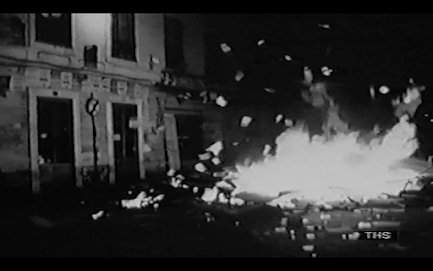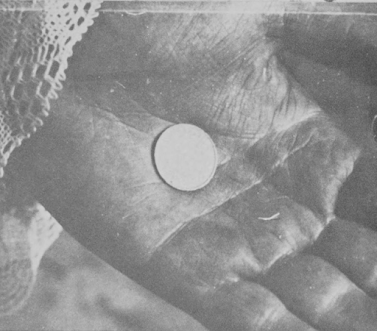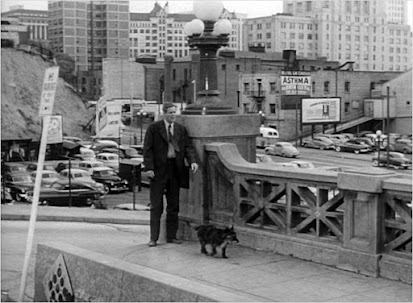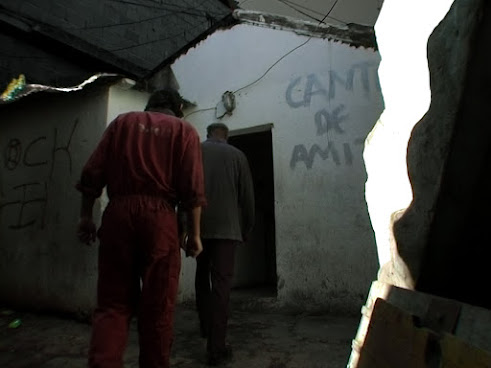*
WHERE ARE WE GOING TO LIVE?
A Film Series
on Housing Problems
programmed by Andy Rector
dedicated to Beatriz Duarte
OCTOBER 12 - 18
CINEMA IDEAL - LISBOA
One week, 17 films
All programs begin at 9pm
5 € admission
*
Series will travel to Porto, Casa das Artes, November 4 - 12.
Supported by OPTEC FILMES upon their upcoming dvd/streaming release of the film AS OPERAÇOES SAAL (OPERATION SAAL, 2007, João Dias).
Introduction and small summaries of each program are below (em português, ligeiramente truncado, aqui). More material (articles, notes, news of guests) will follow as the series develops.
*
A series of films about the betrayal of the right to housing, a right unborn. Not meant to be a sociological event, but simply a selection of films––seven nights at the movies––on the housing problem, the eviction problem, the exploitation problem, pulled from the history of cinema, internationally.
Films showing the economic continuity and human toll of the housing problem over decades––the absolute lock on property relations, the dictatorship of the market over people, then and now.
Here we see legal intrigues, corruption, speculation, theft, eviction, police––the basics of an unchanging capitalism. Invader, redeveloper, kidnapper, exiler, swindler. Orphan-maker, widow-maker. "Che farsa!" an Italian villager yells when being newly told of market realities. “A lot of departed spirits walk with me…” says Cape Verdean Ventura, standing in the aftermath, in Amadora, eating the one small soup his friend Pango can spare.
A group of films that hold, like a silo, historical and human detail on the monstrous inequities. The life and death involved, the solidarity needed. As José Sinho Baessa de Pina (community representative in Casal da Boba and organizer with the agit-group VIDA JUSTA) says: "The spirit of unity and solidarity is a process," one torn apart precisely when “everyone is worried about their home”. Many souls in these films survive through some kind of solidarity: fellow workers prevent an eviction; a snitch threatening a Hooverville shantytown is thwarted; a mother's memory of "back home" is shared for strength; a warning is passed on before it's too late; the simple twist of a screwdriver of a telephone company worker restores the unpaid line of a desperate man…
Classical film, B-film, epic, questing documentary, horror film, propaganda, melodrama, music film, student film, silent film, militant film, plus the unclassifiable. Many of these films are of the popular cinema, if not “becoming-popular” (as Bernard Eisenschitz wrote of Dudow/Brecht, Straub/Huillet).
In the love and hate, dream and nightmare, hope and despair that cinema projects, one finds it has always been concerned with housing, seen from the bottom (and sometimes the top––rarely the middle). Chaplin’s Tramp was a so-called “homeless”. Pedro Costa: "Cinema was always here to serve the defenseless. We risk forgetting that. (...) Perhaps these scenes in which respect is shown towards them can make us see the injustice."
A small contribution to the fight against the grotesque rent and food prices impoverishing and displacing the majority of us now. In solidarity with the upcoming VIDA JUSTA-organized protest in Lisbon (Rossio), October 21, demanding: "End the rising costs, we want houses to live in, transport for all, wage increases, no police repression in our neighborhoods."
*
OCTOBER 12, Thursday
AS OPERAÇÕES SAAL
Operation SAAL
2007, João Dias. 127 min. Portugal
*Director João Dias in attendance*

OCTOBER 13, Friday
LES MAISONS DE LA MISÈRE
Houses of Poverty
1936, Henri Storck. 29 min. Belgium
Francês com legendas em inglês
MISÈRE AU BORINAGE
Misery in Borinage
1934, Henri Storck, Joris Ivens. 34 min. Belgium
Francês com legendas em inglês
KUHLE WAMPE ODER: WEM GEHÖRT DIE WELT?
Kuhle Wampe or: To Whom Does the World Belong?
1932, Slatan Dudow, Bertolt Brecht. 70 min. Germany
Alemão com legendas em inglês
*Portugal Premiere of 2020 Restoration*
Sessão: 2 horas 15 min, mais intervalo
Three films in which dismal living and working conditions, eviction and dispossession do not come with the inevitability of an earthquake or flood, but are seen critically and agitated against, cause and effect relations unmasked. Films which intended to intervene on reality.
OCTOBER 14, SATURDAY
THE GOLDEN LOUIS
1909, D.W. Griffith. 7 min. E.U.A.
Filme mudo, legendas em inglês sem acompanhamento musical
THE USURER
1910, D.W. Griffith. 17 min. E.U.A.
Filme mudo, legendas em inglês sem acompanhamento musical
ONE IS BUSINESS, THE OTHER CRIME
1912, D.W. Griffith. 15 min. E.U.A.
Filme mudo, legendas em inglês sem acompanhamento musical
IL RITORNO DEL FIGLIO PRODIGO –– UMILIATI: CHE NIENTE DI FATTO O TOCCATO DA LORO, DI USCITO DALLE MANI LORO, RISULTASSE ESENTE AL DIRITTO DI QUALCHE ESTRANEO (OPERAI, CONTADINI - SEGUITO E FINE)
2003, Jean-Marie Straub, Danièle Huillet. 64 min. Itália, França, Alemanha
Italiano com legendas em português
O NOSSO HOMEM
2010, Pedro Costa. 26 min. Portugal
Português e crioulo com legendas em português
sessão: 2 horas 3 min, sem intervalo
Five fables. Three by D.W. Griffith on the evils of the economy, accumulation, corruption, the tenuousness of charity and class reconciliation; with forms of montage that seem to express outrage that rich and poor coexist at all. One by Straub/Huillet, HUMILIATED: No sooner does an impromptu commune in post-war Italy establish itself and begin to overcome its internal challenges, does a zombie of the cadastre, possessed by propriety, arrive and declare that everything they've cultivated is already owned: the land, the water, even their wills (to clear the forest of landmines, to produce wheat non-industrially...). And finally, Pedro Costa's O NOSSO HOMEM, about the struggle of a Portuguese-born child of Cape Verdean immigrants to gain an ounce of peace, under threat of expulsion, as if not a citizen, alongside the story of a bricklayer, possibly beaten to death by racists in Amadora.
OCTOBER 15, Sunday
CHICAGO CALLING !
1951, John Reinhardt. 75 min. E.U.A.
Idioma inglês sem legendas
BUNKER HILL
1956, Kent Mackenzie. 18 min. E.U.A.
Idioma inglês sem legendas
THE FINAL INSULT
1997, Charles Burnett. 55 min. E.U.A.
Idioma inglês sem legendas
sessão: 2 horas 28 min. mais intervalo
A concrete focus, in two films, on a specific place, Bunker Hill, downtown Los Angeles. One, CHICAGO CALLING, about a penniless recovering alcoholic who must suddenly find $53 to pay his phone bill, to hear news of his faraway wife and daughter, on whom his life depends. The problem of utility bills must not be left out of any housing rights to speak of. And another, BUNKER HILL, a soft-spoken film on the elderly pensioners who live on "the Hill", now threatened by commercial redevelopment, the demolition of their home and community. Then, a rough video-poem by Charles Burnett on being homeless, living out of one’s car in Los Angeles while working a low-wage job as a “temporary accountant” at Bank of America.
OCTOBER 16, Monday
MAN’S CASTLE
A Vida é um Sonho
1933, Frank Borzage. 75 min. E.U.A.
Idioma inglês sem legendas
**4K digital copy**
ANNUSHKA
1959, Boris Barnet. 89 min. U.R.S.S.
Russo com legendas em inglês
sessão: 2 horas 44 min. mais intervalo
A double bill. One Hollywood film (Borzage), one Soviet (Barnet)––a love story, a family story––on the restless yearning for a decent home amidst war: class war, world war. On the importance of being stubborn, even while living under or fleeing intolerable circumstances.
OCTOBER 17, Tuesday
MINGUS
1968, Thomas Reichman. 58 min. E.U.A.
Idioma inglês sem legendas
EL BRUTO
O Bruto
1953, Luis Buñuel 81 min. México
Espanhol com legendas em português
sessão: 2 horas 19 min. mias intervalo
What has eviction achieved? It has ruined Charlie Mingus's dream of a new music school in the Lower East Side, New York.
Plus, a popular Mexican melodrama by Luis Buñuel, a tale and dissection of the family ties between a landlord, a "Brute”, and a group of tenants organizing themselves.
OCTOBER 18, Wednesday
JUVENTUDE EM MARCHA
Colossal Youth
2006, Pedro Costa. 155 min. Portugal
Português e crioulo com legendas em português
Guest: José Sinho Baessa de Pina, who appears in the film as the "Gulbenkian Security Guard", and is today a community representative of Associação Cavaleiros São Brás and VIDA JUSTA.
*
*The series title ONDE VAMOS MORAR? - WHERE ARE WE GOING TO LIVE? comes from a song lyric by José Afonso, from “Canção Do Desterro (Emigrantes)” - "Song of Exile (Emigrants)".
With deep thanks to: João Dias, Abel Ribeiro Chaves, José Sinho Baessa de Pina, Rodrigo Dâmaso, Charles Burnett, Pedro Costa, Aurora Neves, Maria Capelo, José Neves, Mosfilm Cinema Concern, Christophe Clavert, Marta Mateus, Filipe Baixinho, Anna Neher, Sara Jesus, Billy Woodberry, Torpeda, Eliel Santos, Cinema Ideal, Kyriakos Dionysopoulos.







































































